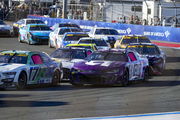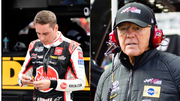
via Imago
LOS ANGELES, CA – FEBRUARY 05: Bubba Wallace 23 23XI Racing DoorDash Toyota tries to block Austin Dillon 3 Richard Childress Racing Get Bioethanol Chevrolet while under caution after being spun into the wall by him in turn 2 towards the end of the race during the NASCAR, Motorsport, USA Cup Series Busch Light Clash at The Coliseum on February 05, 2023, at the Los Angeles Memorial Coliseum in Los Angeles, CA. Photo by Chris Williams/Icon Sportswire AUTO: FEB 05 NASCAR Cup Series Busch Light Clash at The Coliseum Icon0072302051215

via Imago
LOS ANGELES, CA – FEBRUARY 05: Bubba Wallace 23 23XI Racing DoorDash Toyota tries to block Austin Dillon 3 Richard Childress Racing Get Bioethanol Chevrolet while under caution after being spun into the wall by him in turn 2 towards the end of the race during the NASCAR, Motorsport, USA Cup Series Busch Light Clash at The Coliseum on February 05, 2023, at the Los Angeles Memorial Coliseum in Los Angeles, CA. Photo by Chris Williams/Icon Sportswire AUTO: FEB 05 NASCAR Cup Series Busch Light Clash at The Coliseum Icon0072302051215
Toyota entered NASCAR in 2007 to boost sales. The Japanese automaker became the first foreign manufacturer since the 1950s to compete with American brands like Chevrolet, Ford, and Dodge. And look where they have come. Joe Gibbs Racing is a championship-contending team in the NASCAR Cup Series, with drivers like Christopher Bell wheeling Toyota Camry to victory. However, even this powerful automotive presence is witnessing cracks in its foundation.
With NASCAR and consumer markets in the US going for electric options, Toyota is in a fix. Sales have plummeted in the face of a greener future looming closer than ever. Yet the walls seem to be caving in on Toyota from another side as well, as its home-ground competitors leveled up.
ADVERTISEMENT
Article continues below this ad
Toyota reeling under stress due to rivals
In Japan, a mighty automotive announcement was made recently. Honda and Nissan are in talks to merge by 2026. The purpose is mainly to beat the threat that Chinese EV makers now pose to the world’s long-dominant legacy car makers. Other domestic makers of electric and hybrid cars loaded with innovative software are also a threat. Yet their impact may be more than that – the merger would create the third-largest auto group by vehicle sales after Toyota and Volkswagen. Aiming for a combined sales of 30 trillion yen ($191 billion) and operating profit of more than 3 trillion yen through the potential merger throws up a huge challenge for Toyota.
Toyota’s global sales have already taken harsh blows since November. According to a recent report shared by Adam Stern on X, vehicle sales totaled 984,348 units last month, down 0.2% versus November 2023. Production declined 9.4% year-on-year to 966,921 units. In Japan, the local automaker’s output between January and November fell 7.3%. This is a direct impact of rising competition, exacerbated by Honda and Nissan’s latest merger. Smaller Mitsubishi Motors, in which Nissan is a top shareholder, is also considering joining and will decide by the end of January.
“Toyota’s global sales plateaued in November as lackluster demand coalesced with a pause in production… Its business is feeling the strain of intense competition over hybrid gasoline-electric cars in the U.S. and locally made electric vehicles in China.” https://t.co/EeUhC0mjcF
— Adam Stern (@A_S12) December 25, 2024
Besides its local competition, Toyota is also feeling the strain due to electric vehicles. Intense competition with hybrid gasoline-electric cars in the U.S. and locally made electric vehicles in China has also contributed to its plummeting demands. A report by Just-Auto pointed out the penetration rate of Japanese brands in China. In a graph, it can be seen that the current rate is at around 15%, compared to its lofty status of 25% in 2020. This also marks the lowest penetration rate since 2016, which was around 17%. Certainly worrying signs for Japan and it’s no surprise to see Honda and Nissan keen on a merger.
What’s your perspective on:
Is Toyota's resistance to EVs a bold move or a stubborn refusal to adapt?
Have an interesting take?
Despite this bleak narrative, Toyota itself has rolled out a comprehensive EV project. It includes hybrids, plug-in hybrids, and a fuel-cell electric vehicle consisting of 29 electrified models. This complies with legislation prohibiting sales of gasoline-powered vehicles by 2035. Toyota even wants to deliver 1.5 million EVs by 2026, or 14% of its estimated sales total.
Yet the company’s top executives remain firmly opposed to a changing automotive future.
ADVERTISEMENT
Article continues below this ad
Trending
Turning their backs on EV
We all know about the backlash NASCAR faced during the Chicago Street Race this year. No, we are not dwelling upon the race itself, but a segment of activities before the race. The first-ever NASCAR ABB EV prototype debuted, emitting no sound while doing demonstration laps. Fans criticized this new step toward the future that may topple their typical tune of roaring, gas-guzzling V8 engines. Similarly, Toyota Motor Corp.’s North American COO Jack Hollis criticized American policies speeding up EV rollouts last month. He called the adoption of electric vehicles a “de facto mandate” out of sync with consumer demand.
Hollis’s point centered around the organic adoption of electric vehicles. He adamantly opposed rules penalizing gas-powered car sales. Pointing to tailpipe emission rules from the Environmental Protection Agency, Hollis said, “The whole EV ecosystem is ahead of the consumer; It’s not in alignment with consumers. It’s just not.” This view aligns with that of Akio Toyoda, the current chairman of the company. According to an August report, he believed that battery electric vehicles (BEVs) are not the final answer. He forecasted that sales of fully electric vehicles would remain at 30% “no matter how much progress BEVs make.”
ADVERTISEMENT
Article continues below this ad
Yet EVs are not the only threat Toyota faces. With competitors both in Japan and globally seeking to choke the brand, it may need to look for a good solution.
ADVERTISEMENT
ADVERTISEMENT
ADVERTISEMENT
ADVERTISEMENT







Is Toyota's resistance to EVs a bold move or a stubborn refusal to adapt?